Live on the homepage now!
Reader Supported News
Warren (D-Mass.) is familiar with the history of progressive advocates being consistently dismissed until their visions become realized. At the height of her 2020 presidential campaign, she delivered a remarkable speech putting her ambitious plans in powerful perspective: “Over and over throughout our history, Americans have been told that big structural change just wasn’t possible: They should just give up. … They didn’t give up. They organized. They created a grass-roots movement. They persisted. And they changed the course of American history.”
Soon after, Warren’s groundbreaking proposals netted her only 63 of the necessary 1,991 delegates to secure the Democratic nomination. Then, she was passed over for both the vice presidency and the Cabinet.
And today, despite her tireless work for progressive priorities, she remains out of the spotlight. Yet we see the fruits of her labor in policies that have become the backbone of the Democratic platform — some of which may now become the law of the land.
During her presidential campaign, when Warren introduced her wealth tax on ultra-millionaires as a solution to widening wealth inequality and failing social services, several other Democratic candidates sharply rebuked her.
Just a couple of years later, a different story is unfolding. As Democrats seek to salvage Biden’s Build Back Better plan, a billionaires’ tax now has overwhelming support in the Democratic caucus, though with the notable — and crucial — exception of Sen. Joe Manchin III (D-W.Va.). While Manchin’s opposition means the billionaires tax may not make it into the final agreement, another idea championed by Warren will likely be a key component. That would be the “corporate minimum tax,” which would require companies with more than $1 billion dollars in revenue to pay at least 15 percent of their profits. This idea has been waiting, as economist Robert Kuttner put it, for “the right moment to rendezvous with a political need” — and the social spending bill negotiations provided it.
Warren has also been a fiercely consistent advocate for universal child care and pre-K, even before it seemed politically possible. In 2019, she proposed a plan to guarantee child care and early education for all American children — urgently necessary, as more than half of Americans live in child-care deserts. Many opposed the policy, calling it misguided and unserious.
But now, increased child-care subsidies are wildly popular, so much so that even many skeptics have finally come around. (One skeptic? Biden himself, who as a senator in the 1980s worried that child-care tax credits would subsidize “the deterioration of the family.”) Even after trillions of dollars in cuts to the social spending bill, child care has thus far been spared. Meanwhile, universal pre-K, which has been tremendously successful in cities such as New York, is a similarly uncontroversial element of the reconciliation bill. Even Manchin doesn’t want to cut it.
The trend is clear: Warren has fought ceaselessly to make progressive visions a reality — because she understands that throughout history, persistence has made change possible.
Warren delivered that campaign speech on big structural change just half a block from the site of the Triangle Shirtwaist Fire, where, in 1911, a corporation’s negligence toward its workers cost 146 lives. (That event particularly resonates in a year in which we’ve seen strikes against at least 178 employers, and Americans are demonstrating the most public support for unions since 1965.) After the 1911 fire, female factory workers across the city protested and went on strike. They were routinely ignored until one witness, Frances Perkins (then executive secretary of the New York City Consumers League), successfully pushed for labor reforms in New York state. Perkins went on to become labor secretary for President Franklin D. Roosevelt — the first woman ever to hold a U.S. Cabinet position — and the reforms she pushed for in New York became part of the blueprint for the New Deal.
“So what did one woman — one very persistent woman — backed by millions of people across the country, get done?” Warren asked. “Social Security. Unemployment insurance. Abolition of child labor. Minimum wage. The right to join a union. Even the very existence of the weekend. Big. Structural. Change.”
She’s right. Change comes from people like Perkins and Warren: those with the moral clarity and the tenacity to continue the fight for progress, through losses and long odds — until that “right moment to rendezvous with a political need” finally arrives. And for her efforts, Warren hasn’t gotten the credit she deserves.
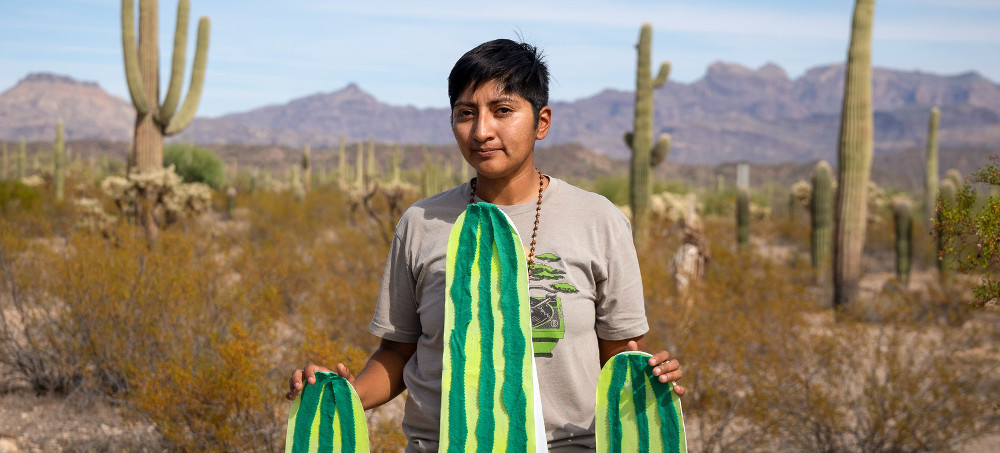 Amber Ortega, a Hia Ced O'odham and Tohono O'odham activist poses for a portrait in the Organ Pipe Cactus National Monument on Nov. 9, 2019. (photo: Kitra Cahana/MAPS)
Amber Ortega, a Hia Ced O'odham and Tohono O'odham activist poses for a portrait in the Organ Pipe Cactus National Monument on Nov. 9, 2019. (photo: Kitra Cahana/MAPS)
Amber Ortega was arrested for blocking construction on sacred lands in southern Arizona. She now faces trial in Tucson.
Under President Donald Trump, government contractors rumbled across Organ Pipe’s pristine desert habit in multi-ton vehicles, pumped hundreds of thousands of gallons of water from the aquifer that sustains the springs, and blew apart sections of a nearby burial ground with powerful explosives to make way for the wall. In September 2020, Ortega and David were praying at the springs when they encountered one of the construction crews. The pair sat on the crew’s vehicles and told them they were not welcome. Tactical teams of Border Patrol agents and park police were called in, and Ortega and David were arrested.
For a low-level misdemeanor usually handled with a trespassing ticket, the two women were strip-searched, shackled, and driven to a for-profit jail 130 miles away, where they were held incommunicado, without access to a lawyer, for nearly 24 hours. Early on in her case, a court-appointed lawyer told Ortega that efforts to fight her charges, which carry a maximum six-month sentence, were likely to fail. Ortega is no longer working with the attorney. While she could understand where the lawyer was coming from, for her, not fighting was not an option.
“I wanted to move forward with it to bring awareness to the oppression that we as Native people, as O’odham, have endured. We have been denied our voice,” Ortega told The Intercept. “We’ve had our rights and access to lands, to sacred sites, taken by the United States government, and this has been happening since colonization.”
On Thursday, Ortega will enter a plea of not guilty in her case and make an argument to a Tucson court that the actions she was arrested for were rooted in deeply held spiritual beliefs. Ortega’s new lawyer, Tucson-based civil rights attorney Paul Gattone, believes they have strong case. “She is a young Native American woman who has strongly held beliefs, religious, and cultural beliefs — that’s why she was out there,” Gattone told The Intercept. “Because of those cultural and religious beliefs, she felt compelled to take action, and that’s what she did.”
The trial marks the first instance of the Biden administration continuing a Trump-era prosecution of a borderlands advocate in Arizona, and the second time in recent years in which an activist in the state has mounted a religious freedom defense in response to high-profile charges linked to the government’s border security apparatus. Humanitarian worker Scott Warren, whom the Trump administration accused of human smuggling for providing aid to migrants in the desert, made a successful religious freedom defense against two attempted federal prosecutions in 2019. Brought by the National Park Service, Ortega’s case has the Department of Interior prosecuting Ortega for attempting to halt the very same construction that the agency’s own top official, and first Native American secretary, Deb Haaland, spoke out about as a member of Congress.
Though President Joe Biden vowed that “not be another foot of wall” would be built under his administration, his record on Trump’s signature ambition has been mixed. In South Texas, new sections of wall are being built; in Arizona, the Justice Department is locked in a legal battle with the state attorney general, who argues that by halting wall construction in the state, the president is pursuing a project of “population augmentation” aimed at flooding the country with foreigners. In a recent Senate confirmation hearing, Biden’s pick for commissioner of Customs and Border Protection, Tucson Police Chief Chris Magnus, said he would support expanded wall construction along some areas of the border. The Senate Finance Committee will vote on Magnus’s nomination today.
At the core of Ortega’s decision to fight the case is what she describes as a “scary spiritual battle” against cultural erasure. With the 1854 Gadsden Purchase and the drawing of the modern U.S.-Mexico divide, the O’odham, which means “people” and includes multiple tribes, saw their physical world cleaved in two. In more recent years, O’odham lands in southern Arizona have been made the site of an unprecedented explosion in border militarization. While they contended with the ramped-up surveillance and law enforcement, the Hia Ced O’odham, the smallest of the O’odham tribes, waged a three-decade struggle to obtain formal recognition of their existence from the wider tribal system. Those efforts paid off in 2013, with Hia Ced O’odham officially joining Tohono O’odham Nation, though Ortega contends that the federal government’s continued treatment of O’odham lands as a war zone in need of fortification represents another failure see the Hia Ced as a people.
For thousands of years, the rare Sonoran Desert aquifer that feeds Quitobaquito Springs has provided the only source of fresh water for hundreds of miles around, making it a vital source of life and refuge for plants, animals, and people in the region. To mix concrete for the wall and spray down the dirt roads used by Trump’s construction crews, government contractors tapped into the aquifer and withdrew hundreds of thousands of gallons of water. In July 2020, just two months before Ortega and David’s arrest, National Geographic reported that in a span of just a few months, the flow of water into the springs had dropped by 30 percent, leading to the lowest water level in more than a decade. It is doubtful that the oasis will ever fully recover.
“It’s been disturbing, but we need to speak on these things because it’s our voices and our people. It’s our unity that we’re fighting for,” Ortega said. “It’s not just me. I’m not going through this by myself. I’m going through this with my people. This is generational. This is the memory of our ancestors. It’s our history. It’s our way of life.”
The road to this week’s trial has been immensely difficult for both Ortega and David. In interviews with The Intercept, the two women described how the traumatic events that accompanied their arrests stretched out for months. The arrest itself had already “felt like an extremely unsafe situation,” Ortega said. With armed men of the U.S. government asserting their authority over the land and the Native American women standing before them, the moment was fraught with dark historical overtones. In a video from the scene, Ortega could be heard imploring the agents to take their weapons away.
“This is something that we, as O’odham, we’re familiar with. They do these things,” Ortega said. “The bigger story is we’re a traumatized generation and have been living these traumas.”
During their detention at the Florence Correctional Center, a medium-security federal facility owned and operated by the private prison corporation CoreCivic, Ortega and David, 38, were initially housed in an area reserved for men, without being told what charges they were facing or how long they would be locked up. “It was like they wanted to make a show of us. They knew we were women,” Ortega said. “They walked us into a men’s area, led us into our own cage, surrounded by men, and when Nellie asked to use the restroom, he said, ‘Oh, you’re women.’ And so then he let us out.” CoreCivic denied the claim.
Once released, the pair was placed under the strict supervision of the pretrial services office of the District Court of Arizona. For their refusal to leave land that the O’odham have tread since before the United States existed, the government ordered the women to submit to at-will home inspections, repeated urine sample testing, and strict prohibitions on travel. If they failed to consent, the government could issue warrants for their arrest.
Early on, David said, she made a request to visit Puerto Peñasco, a Mexican city on the Sea of Cortez where her family members are from, to pray and collect her thoughts. “I really wanted to go to the ocean, near the Pinacates, and just pray there,” she said. “I felt like that would just do so much, because so much had been desecrated.” The government denied the request. According to David, the situation got worse from there. “This whole year they’ve treated my body as if it’s their property,” she said. “Like what we did made my body available to them 24/7, and I have not been OK with that.”
The restrictions on movement, the constant check-ins, the repeated demands for her urine, and the threat that any failure to comply would result in the total negation of her freedom have felt to David like a new and intensified extension of the border surveillance that has shaped so much of the modern O’odham experience. “We’ve lived our entire lives under this heavy surveillance,” she said. “They were using our trauma against us.” David left law school to manage the continual demands of the court, but it was not enough. The pressure from the case began to take a serious toll on her mental health, triggering painful memories and unsettling reflections on the historical relationship between Native American women and the U.S. government. “I definitely needed mental help,” David said. “I was talking to everybody I know about it.”
Early on, Ortega and David were told to expect to go to trial in a couple months. That didn’t happen. “That’s how they eventually wore me down,” David said. In June, she pleaded guilty to her charges stemming from the 2020 arrest. She was fined $200.
Ortega, who decided to press on, described being similarly scarred by her experience with the government’s pretrial surveillance apparatus. “I shake when I call them,” she said. “I know I’m not doing anything wrong, but I literally shake.”
In the past year, Ortega has been pulled over several times by various government agencies while running errands and visiting family on the O’odham reservation. She has no doubt that the encounters are related to her activism. The stops in her home village are particularly disturbing. “I grew up in the village,” Ortega said. “They know who I am.”
The pressure resulting from her case became so intense that Ortega, too, took a semester off school to cope. “There was a point where it felt like every single move, every single week, there they were in some way: on the phone requesting a home visit, a UA sample, an in-office visit,” she said. “There was one thing after another.”
Often, in video calls with her pretrial service officer, Ortega was ordered to provide a guided tour of her living space. She saw her ability to participate in tribal ceremonies strangled by the government’s intrusion of her day-to-day life. “It was like I needed to be at a job and prove it and clock in,” she said. With her trial approaching, the memories of her arrest and what the moment meant has lingered in Ortega’s mind. “The day I was arrested, it was a reminder of what has already been done,” she said. “The displacement. The removals. It was hurtful to go through that, to understand the history, and then to go through that.”
“Generational trauma exists, and it’s not OK,” Ortega said. “We’re good people. We’re humble people. We get angry too, though. And we get hurt.”
 The US said it had 'reasonable cause to believe ... [NSO] has been involved in activities contrary to the foreign policy and national security interests of the US.' (photo: iStock)
The US said it had 'reasonable cause to believe ... [NSO] has been involved in activities contrary to the foreign policy and national security interests of the US.' (photo: iStock)
Decision against company at heart of Pegasus project reflects deep concern about impact of spyware on US national security interests
The finding by the commerce department represents a major blow to the Israeli company and reveals a deep undercurrent of concern by the US about the impact of spyware on national security.
The company’s signature spyware – known as Pegasus – is alleged to have been deployed by foreign governments against dissidents, journalists, diplomats and members of the clergy, with several alleged victims in the UK. Its clients have included Saudi Arabia, the United Arab Emirates, Hungary and India.
The new designation – which places NSO in the company of hackers from China and Russia – comes three months after a consortium of journalists working with the French non-profit group Forbidden Stories, revealed multiple cases of journalists and activists who were hacked by foreign governments using the spyware, including American citizens.
The Guardian and other members of the consortium also revealed that the mobile numbers of Emmanuel Macron, the French president, and nearly his entire cabinet were contained on a leaked list of individuals who were selected as possible targets of surveillance.
“Today’s action is a part of the Biden-Harris administration’s efforts to put human rights at the center of US foreign policy, including by working to stem the proliferation of digital tools used for repression,” the commerce department said in a statement.
The commerce department said it included NSO – as well as three other companies – on the so-called “entity list” because it had “reasonable cause to believe, based on specific and articulated facts, that the entity has been involved, or is involved, or poses a significant risk of being or becoming involved in activities that are contrary to the national security or foreign policy interests of the United States”.
In effect, it means that NSO will be barred from buying parts and components from US companies without a special licence. It also puts a cloud over the sale of the company’s software globally, including in the US.
The commerce department said that “investigative information” had shown NSO and another Israeli surveillance company called Candiru had developed and supplied spyware to foreign governments that used this tool to “maliciously target government officials, journalists, businesspeople, activists, academics, and embassy workers”.
NSO has said that its spyware is used by foreign government clients to target serious criminals. It has denied that any of its clients ever targeted Macron or any French government officials.
But in the weeks that followed the publication of the Pegasus project, Israeli officials met with counterparts in the US and France to discuss allegations of abuse of the technology.
Israel has long claimed it maintains robust oversight over any weapon sales to foreign governments. But following the publication of the Pegasus Project this summer and its diplomatic fallout, Israeli officials – both in public and private – have appeared to distance the government from private weapons companies.
Yair Lapid, the country’s foreign minister, said in September that the government had only limited control on how defence exports are used. He added: “We are going to look at this again.”
When Pegasus – NSO’s signature spyware – is deployed, it can intercept phone conversations and texts, as well as photographs and any other material on a phone. It can also turn a phone into a listening device.
An NSO spokesperson said: “NSO Group is dismayed by the decision given that our technologies support US national security interests and policies by preventing terrorism and crime, and thus we will advocate for this decision to be reversed.
“We look forward to presenting the full information regarding how we have the world’s most rigorous compliance and human rights programs that are based on the American values we deeply share, which already resulted in multiple terminations of contacts with government agencies that misused our products.”
A spokesperson for the Israeli embassy in London did not immediately return a request for comment.
The Biden administration’s move represents a victory for researchers at Citizen Lab and Amnesty International, who have documented multiple cases of alleged human rights abuses using spyware dating back to 2016. The research has been heavily criticised by NSO but the Biden administration’s decision has, in effect, vouched for the researchers’ findings.
“With this move, the US government has acknowledged what Amnesty and other activists have been saying for years: NSO Group’s spyware is a tool of repression which has been used around the world to violate human rights,” said Danna Ingleton, deputy director of Amnesty Tech. “This decision sends a strong message to NSO Group that it can no longer profit from human rights abuses without repercussions.”
It also marks a step forward for US technology companies such as WhatsApp and Microsoft, who have said spyware made by NSO threatens the safety of their users.
WhatsApp, which is suing NSO in a US court following allegations that the technology was used to target 1,400 of its users in 2019, said the administration’s decision was “an important step in protecting people’s private communication and personal safety”.
“We’re grateful to see the US government stand up for human rights and hope to see more nations act to protect people’s ability to have private conversations online,” said a WhatsApp spokesperson, Carl Woog. NSO has denied it was responsible for attacks on WhatsApp users and is seeking to have the matter dismissed.
There was no immediate indication that the UK would follow the US in condemning NSO.
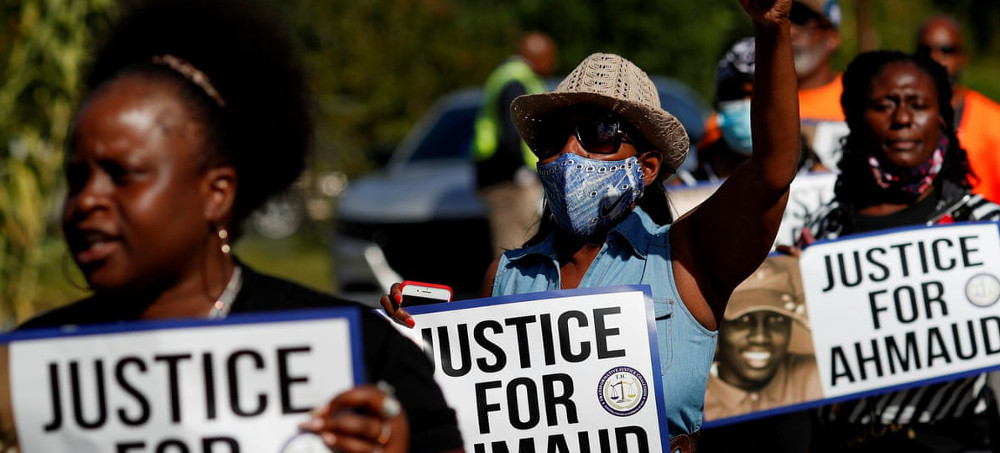 People participate in a protest demanding justice for Ahmaud Arbery in Brunswick, Georgia, on last month. (photo: Octavio Jones/Reuters)
People participate in a protest demanding justice for Ahmaud Arbery in Brunswick, Georgia, on last month. (photo: Octavio Jones/Reuters)
Prosecutors alleged racial discrimination Wednesday in jury selection, formally challenging eight of the defense picks. But the judge rejected the prosecutors’ argument, saying the defense gave sufficient reasons other than race for their choices.
Black people made up a quarter of the finalist jurors; the jury ultimately included one Black man and 11 White people.
The clash came in the final hours of the more than two-week-long jury-selection process in the trial of three White men accused of racially profiling a Black jogger in February 2020. Arbery was chased by the men in trucks and fatally shot in the coastal community of Satilla Shores near Brunswick. The case — which went months without arrests before a leaked video kindled national outrage — helped fuel historic racial justice protests ignited by the murder of George Floyd in Minneapolis.
Gregory McMichael, his son Travis McMichael and their neighbor William “Roddie” Bryan have pleaded not guilty to charges including murder, aggravated assault and false imprisonment. They also face federal hate crime charges for which another trial is set next year.
The defendants argue they had valid grounds to carry out a “citizen’s arrest” after suspecting Arbery of neighborhood break-ins. Travis McMichael has said he shot Arbery in self-defense. The video at the center of the case, filmed by Bryan, shows Arbery running past the McMichaels’ truck and then toward Travis McMichael, with whom he struggles as shots are fired.
The jury will return to court Friday morning.
Defense lawyers said Wednesday that they struck the Black potential jurors for reasons other than their race. One knew Arbery and shared a desire to “keep his name alive,” they said. Another came to court believing Arbery was “hunted” and “killed like an animal.” Yet another seemed promising at first, they said, but was about to get married to a woman who had expressed support for Arbery on her Facebook page, using the rallying cry “I Run with Maud.”
The prosecution countered that many jurors arrived at the Brunswick courthouse with feelings about the case, which has drawn worldwide media coverage and strikes at issues that may be deeply personal for those called in. Yet they were kept in the running because they said they could still consider the case fairly.
One thousand people were summoned for potential service last month, an early sign of how challenging it could be to pick a jury from the small community in which both Arbery and the defendants lived. Questioning of potential jurors stretched more than two weeks as person after person was dismissed, many after saying they did not believe they could be impartial. Some worried about backlash for whatever verdict they might deliver.
The defense has argued that Arbery’s race has no bearing on the case, and attorneys sought to convince the judge Wednesday that the stricken jurors’ race, too, was incidental.
“Most of the jury selection in this case … is the epitome of the lesser of two evils,” said Laura Hogue, a lawyer for Gregory McMichael. “We are stuck between a rock and hard place given the fact that the majority of the African American jurors that came in here were struck for cause immediately because of their firm opinions.”
Hogue said the defense had good reason to strike Black prospective jurors with strong feelings, even those who said they could set their opinions aside. “Would you want that juror judging you in this case? … The answer is a resounding ‘No.'”
The defense also struck some White potential jurors, while prosecutors used all of their strikes on White jurors.
Ben Crump, an attorney for Arbery’s family, said in a statement Thursday that the jury should reflect the broader community and called the exclusion of Black jurors "a cynical effort to help these cold-blooded killers escape justice.”
Many potential jurors were previously removed from the pool “for cause,” because they were deemed not qualified or had obligations that would interfere with their service. Lawyers were then given a limited number of “peremptory strikes,” for which they need not give a reason.
When a strike is challenged as racially motivated, however, lawyers must give a “race-neutral” justification for their choice.
Those reasons are “pretty easy to find,” said Ashleigh Merchant, a Georgia attorney who has been following the case and knows lawyers on both sides.
Upholding the defense’s strikes, Judge Timothy Walmsley echoed that the court cannot reseat jurors because of a racial imbalance. The strike prevails if lawyers can give a reasonably specific and relevant explanation.
As Cobb County prosecutor Linda Dunikoski said that the defense’s stated reasons for excluding Black potential jurors were not “genuine,” courtroom discussions grew heated. Kevin Gough, an attorney for Bryan, called the prosecution’s arguments “Kafkaesque” and declared, “I feel like I’m in the Twilight Zone.”
“In what free country would a juror who went on a bike ride to raise money for the opposing side’s legal team … the defendant could not strike them for that reason, and that reason alone?” he said.
Defense lawyers noted that some of the people they used peremptory strikes on were ones they had unsuccessfully tried to remove “for cause” earlier.
“This case is important for a lot of reasons to a lot of people,” said Bob Rubin, an attorney for Travis McMichael. “And I think it is incumbent upon all of us … [not to] ascribe inappropriate or bad motives until you know the facts.”
The strikes mean the jury weighing Arbery’s killing will be markedly less diverse than the one that earlier this year convicted former Minneapolis police officer Derek Chauvin in the murder of Floyd, who was Black. Chauvin, who is White, knelt on Floyd’s neck for more than nine minutes in a scene also captured in viral video.
More than 300 potential jurors for the Chauvin case were whittled to a final group of 12 that included one Black woman, two multiracial women and three Black men. Minneapolis is about 19 percent Black and 64 percent White.
Glynn County, where the jury in Arbery’s killing was drawn, is about 27 percent Black and nearly 70 percent White, according to census data.
The jury selection process kicked off last month with prosecutors and defense attorneys sparring over what questions should be used to screen each panel of prospective jurors. They were especially divided over questions probing people’s views on race.
Candidates were ultimately queried on issues such as their participation in “social justice demonstrations,” their support for Black Lives Matter, their personal histories with racial discrimination and whether they found an old Georgia flag — featuring the Confederate battle emblem — to be a “racist” symbol.
While lawyers disclosed the racial breakdown for the jury of 12, it was not clear Wednesday who exactly was picked as a jury member and who was selected as one of four alternates out of 16 people told to return to court.
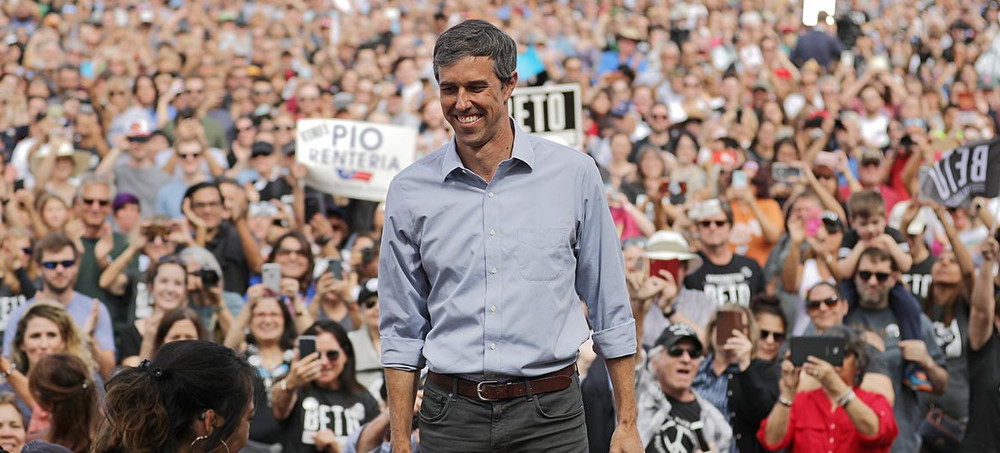 Rep. Beto O'Rourke. (photo: Chip Somodevilla/Getty)
Rep. Beto O'Rourke. (photo: Chip Somodevilla/Getty)
“Abbott’s shift to the hard right may have imperiled his governorship,” said Jason Villalba, president of the Texas Hispanic Policy Foundation.
Abbott currently leads with 44% of support to O’Rourke’s 43-percent, among voters who actually cast ballots in 2020. Ten percent of those polled are currently undecided who they would choose for governor.
The Texas Hispanic Policy Foundation and Rice University’s Baker Institute conducted the survey of 1,402 voters at the end of October. It has a margin of error of 2.6%.
The race is virtually unchanged, the pollsters said, even if actor Matthew McConaughey appears on the ballot as an independent candidate.
“Governor Abbott has shored up his right flank and stands firmly on solid ground with Republican primary voters,” said Jason Villalba, Chairman and CEO of the TxHPF. “But based on our data, it appears that he has achieved this objective by cutting deeply into his support with Texans who vote in the general election. These numbers show that not only can we expect a competitive general election, but that Abbott’s shift to the hard right may have imperiled his governorship.”
For years, Abbott polled among the most popular elected officials in Texas. But since COVID-19, that support has eroded as the governor has turned away from the middle and farther to the right.
As Abbott seeks a third term, he has, for the first time, drawn three Republican challengers, former state Senator Don Huffines, the former chairman of the Republican Party of Texas, Lt. Col. Allen West, and radio host Chad Prather.
But this survey shows Abbott with an overwhelming lead against them in the primary. Abbott is ahead of his conservative opponents with 64% of support. His next closest rival is Allen West, with 13%.
Plus, Abbott has $55-million cash on hand, an enormous amount to sustain his campaign through the primary and general elections.
Beto O’Rourke, a former Congressman from El Paso, came within two percentage points of defeating Ted Cruz for a U.S. Senate seat in 2018. O’Rourke has not announced his candidacy for governor, though many Democrats expect he will run.
“The poll found that 49% of Hispanic respondents favor O’Rourke and 31-percent favor Abbott. Hispanics who are evangelical Protestants are more likely to vote for Abbott (42%) than O’Rourke (37%), while Catholic Hispanics and non-religious Hispanics overwhelmingly favor O’Rourke (56% and 46%) over Abbott (29% and 28%),” according to both groups.
Race for Attorney General
In another notable race, this survey shows Texas Attorney General Ken Paxton has an overwhelming lead in his race for re-election. Paxton faces three Republican opponents in the primary, Texas Land Commissioner George P. Bush, former Texas Supreme Court Justice Eva Guzman, and state Rep. Matt Krause, R-Fort Worth.
The poll shows that Paxton might survive the Republican primary without even facing a run-off election. Paxton has 54% support from likely Republican primary voters. Bush is the next closest candidate with 18%. Guzman and Krause poll in the single digits.
Among Democrats, no candidate commands a strong lead in the primary races for lieutenant governor and attorney general. More than half of likely primary voters said they do not yet know whom they support.
“Abbott and Paxton are showing a great deal of strength heading into the Republican primary,” said TxHPF Director of Research and Analytics Mark P. Jones of Rice University. “So far, no Republican challenger to an incumbent statewide official appears to be gaining any traction.”
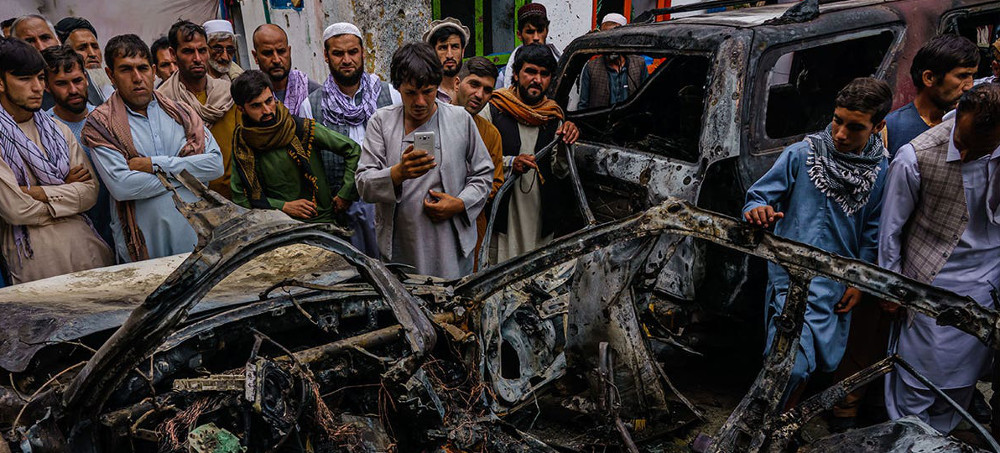 Relatives and neighbors of the Ahmadi family gathered around the incinerated husk of a vehicle targeted and hit earlier Sunday afternoon by an American drone strike, in Kabul, Afghanistan, Monday, Aug. 30, 2021. (photo: Marcus Yam/LA Times)
Relatives and neighbors of the Ahmadi family gathered around the incinerated husk of a vehicle targeted and hit earlier Sunday afternoon by an American drone strike, in Kabul, Afghanistan, Monday, Aug. 30, 2021. (photo: Marcus Yam/LA Times)
But the strike did not break any laws, said Air Force Lt. Gen. Sami Said, the service's inspector general, who led the Pentagon's investigation. He described the tragedy as "an honest mistake."
No single person was responsible for the flawed decisions that led to the airstrike, Said said. His report, which is classified, has been forwarded to commanders who have the authority to discipline those involved, including firing some of them. The officials who authorized the strike, who were located at a military base in Qatar, believed they were "targeting an imminent threat," Said said.
"The assessment which was primarily driven by interpretation of intelligence and observed movement of the vehicle and occupants over an 8-hour period was regrettably inaccurate," according to a summary of the report. "In fact, the vehicle, its occupant and contents did not pose any risk to U.S. forces."
Ten people, including seven children, died in the attack by a Hellfire missile fired by a Reaper drone on Aug. 29. The missile strike came days after terrorists of a self-proclaimed affiliate of the Islamic State called ISIS-K killed 13 U.S. troops and 170 Afghan civilians outside Hamid Karzai International Airport.
Military officials initially announced that the strike had killed at least one suspected suicide bomber from ISIS-K and no civilians. Army Gen. Mark Milley, chairman of the Joint Chiefs of Staff, labeled the attack “righteous.” But accounts from the site by news media, including The New York Times, showed that civilians, not terrorists, had been killed.
The tragic error underscores the hazard of the Pentagon's approach to counterterrorism strikes when no U.S. troops or close allies are on the ground to identify legitimate targets. Military officials refer to the long-distance strikes as "over the horizon," meaning the attacks are informed by spy planes, satellites and intercepted communications.
Said, however, said the botched strike was unlike other "over the horizon" attacks because it was launched relatively quickly and in perceived self-defense. Other counterterrorism strikes have far more time to examine evidence before attacking, Said said.
Investigators interviewed 29 people, 22 of whom were directly involved in the strike, Said said.
The report recommends those involved in developing targets and ordering strikes implement procedures to mitigate confirmation bias, better share information and assess the presence of civilians.
The Pentagon has been exploring ways to compensate family members of the victims.
Hundreds of civilians have been killed in U.S. airstrikes in recent years from Africa to Afghanistan, according to Pentagon figures. The Pentagon paid out $259,899 during fiscal year 2020 and $858,240 in 2019 to compensate families of those killed, according to the Defense Department.
 Trees are cut down for timber, waiting to be transported and sold. (photo: Esemelwe)
Trees are cut down for timber, waiting to be transported and sold. (photo: Esemelwe)
Together they represent more than 85 percent of the world's forests
The U.S., Brazil, and Russia were among the nations that signed the agreement, which is backed by more than $19 billion in public and private funding. Representing more than 85 percent of the world’s forests, the signatories committed to protecting and restoring forests while promoting sustainable land-use and agricultural practices.
Combating deforestation is seen as a crucial step in limiting the impacts of climate change, as the world’s forests absorb roughly one-third of carbon emissions annually. Agriculture, forestry and other land uses account for nearly a quarter of global greenhouse-gas emissions, according to the U.N. Intergovernmental Panel on Climate Change.
“These great teeming ecosystems — these cathedrals of nature — are the lungs of our planet,” said British Prime Minister Boris Johnson in a press release announcing the agreement. “Forests support communities, livelihoods and food supply and absorb the carbon we pump into the atmosphere. They are essential to our very survival.”
In addition to $7.2 billion in private-sector funding, a dozen countries pledged $12 billion to support activities in developing countries such as restoring damaged land, reducing wildfire risk, and supporting Indigenous people and local communities in their efforts to protect their forests.
A group of government and private funders agreed to contribute $1.7 billion to Indigenous communities and organizations, which, according to a study published earlier this year, received less than 1 percent of international funding for climate mitigation and adaptation during the past decade.
In an email to Grist, Wayne Walker, carbon program director at Woodwell Climate Research Center, emphasized the importance of engaging Indigenous communities in efforts to solve the “linked global crises” of forest loss and climate change.
“Bolstering Indigenous land rights and providing communities with much-needed tools and information will continue to be among the most effective approaches we have to addressing these acute global threats,” Walker said.
On Monday, 28 governments announced a plan to rein in agricultural practices that threaten forests, such as the deforestation linked to large-scale oil palm and soybean farms.
Environmental groups were largely supportive of the stated goals of the agreements, though many questioned whether the deforestation targets were realistic and enforceable—while others wondered why they aren’t more ambitious.
“We’re facing a climate emergency so giving ourselves another 10 years to address this problem doesn’t quite seem consistent with that,” Nigel Sizer, former president of the Rainforest Alliance, told BBC News.
Skeptics cited a similar plan adopted in 2014, which sought to halve global deforestation by 2020 and end it by 2030. A later report found that there was “little evidence” the signatories were on track to meet those targets.
Notably absent from that plan was a commitment from Brazil, home to the planet’s largest rainforest, where deforestation has accelerated in recent years. The South American nation was among the signatories of Monday’s agreement, as were multiple Central African nations encompassing the Congo Basin forests, which make up the world’s second-largest tropical rainforest region. Eleven countries, along with the Bezos Earth Fund, agreed to contribute roughly $1.5 billion toward deforestation and restoration efforts in the Congo Basin region.
Follow us on facebook and twitter!
PO Box 2043 / Citrus Heights, CA 95611

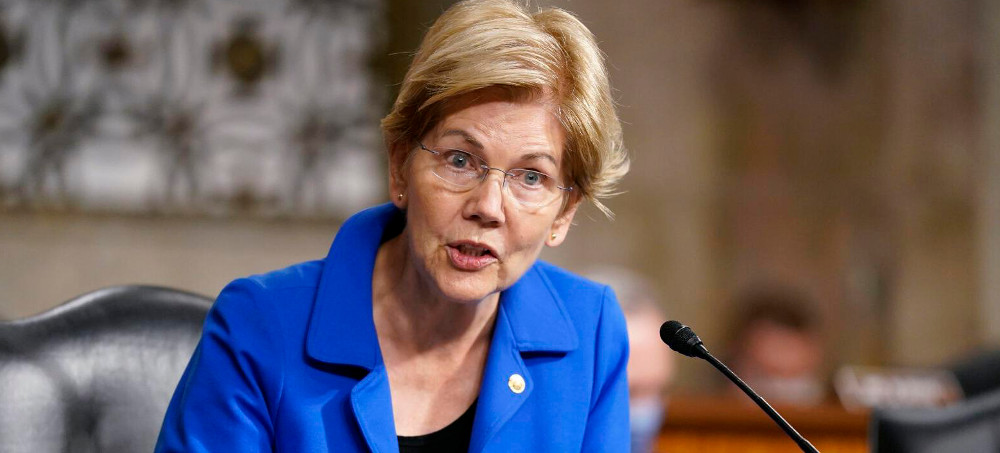

No comments:
Post a Comment